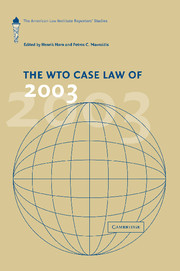Book contents
- Frontmatter
- Contents
- Foreword
- A Note on the American Law Institute
- American Law Institute Reporters
- 1 Introduction
- 2 European Communities – Anti-Dumping Duties on Imports of Cotton-Type Bed Linen from India (AB-2000-13, WT/DS141/AB/R:DSR 2003: III, 965): Recourse to Article 21.5 of the DSU by India
- 3 United States – Sunset Review of Anti-Dumping Duties on Corrosion-Resistant Carbon Steel Flat Products From Japan (AB-2003-5, WT/DS244/AB/R): A Legal and Economic Analysis of the Appellate Body Ruling
- 4 United States – Continued Dumping and Subsidy Offset Act of 2000 (WT/DS217/AB/R: DSR 2003:I,375)
- 5 European Community – Antidumping Duties on Malleable Cast Iron Tube or Pipe Fittings from Brazil (WT/DS219/AB/R: DSR 2003:VI, 2613)
- 6 United States – Final Determination with Respect to Certain Softwood Lumber from Canada (AB-2003-6, WT/DS257/AB/R)
- 7 United States – Definitive Safeguard Measures on Imports of Certain Steel Products (WT/DS259; WT/DS252; WT/DS248; WT/DS249; WT/DS251; WT/DS258; WT/DS254; WT/DS253: DSR 2003:VII, 3117)
- 8 Mexico – Measures Affecting Telecommunications Services (WT/DS204/R): A Comment on “El mess in TELMEX”
- 9 European Communities – Conditions for the Granting of Tariff Preferences to Developing Countries (WT/DS246/AB/R)
- 10 United States – Anti-Dumping Act of 1916 (Original Complaint by the European Communities) – Recourse to Arbitration by the United States under 22.6 of the DSU, WT/DS136/ARB, 24 February 2004: A Legal and Economic Analysis
- 11 Japan – Measures Affecting the Importation of Apples (AB-2003-4): One Bad Apple? (DS245/AB/R): A Comment
- Index
- References
2 - European Communities – Anti-Dumping Duties on Imports of Cotton-Type Bed Linen from India (AB-2000-13, WT/DS141/AB/R:DSR 2003: III, 965): Recourse to Article 21.5 of the DSU by India
Published online by Cambridge University Press: 06 July 2010
- Frontmatter
- Contents
- Foreword
- A Note on the American Law Institute
- American Law Institute Reporters
- 1 Introduction
- 2 European Communities – Anti-Dumping Duties on Imports of Cotton-Type Bed Linen from India (AB-2000-13, WT/DS141/AB/R:DSR 2003: III, 965): Recourse to Article 21.5 of the DSU by India
- 3 United States – Sunset Review of Anti-Dumping Duties on Corrosion-Resistant Carbon Steel Flat Products From Japan (AB-2003-5, WT/DS244/AB/R): A Legal and Economic Analysis of the Appellate Body Ruling
- 4 United States – Continued Dumping and Subsidy Offset Act of 2000 (WT/DS217/AB/R: DSR 2003:I,375)
- 5 European Community – Antidumping Duties on Malleable Cast Iron Tube or Pipe Fittings from Brazil (WT/DS219/AB/R: DSR 2003:VI, 2613)
- 6 United States – Final Determination with Respect to Certain Softwood Lumber from Canada (AB-2003-6, WT/DS257/AB/R)
- 7 United States – Definitive Safeguard Measures on Imports of Certain Steel Products (WT/DS259; WT/DS252; WT/DS248; WT/DS249; WT/DS251; WT/DS258; WT/DS254; WT/DS253: DSR 2003:VII, 3117)
- 8 Mexico – Measures Affecting Telecommunications Services (WT/DS204/R): A Comment on “El mess in TELMEX”
- 9 European Communities – Conditions for the Granting of Tariff Preferences to Developing Countries (WT/DS246/AB/R)
- 10 United States – Anti-Dumping Act of 1916 (Original Complaint by the European Communities) – Recourse to Arbitration by the United States under 22.6 of the DSU, WT/DS136/ARB, 24 February 2004: A Legal and Economic Analysis
- 11 Japan – Measures Affecting the Importation of Apples (AB-2003-4): One Bad Apple? (DS245/AB/R): A Comment
- Index
- References
Summary
Introduction
This chapter addresses the dispute brought to the World Trade Organization (WTO) by India concerning anti-dumping duties imposed by the European Communities (EC) on cotton-type bed linen. An earlier complaint brought by India challenged the anti-dumping duties on a number of points, including the EC practice of “zeroing” for the computation of dumping margins (which had the effect of assigning a negative dumping margin a weight of zero when computing a weighted average dumping margin). India prevailed in that dispute, and the EC responded with Council Regulation (EC) No. 1644/2001, amending the original anti-dumping measure on bed linen from India. India was of the view that the amended measure did not comply with EC obligations under the WTO Anti-dumping Agreement, and brought the proceeding under Art. 21.5 of the DSU that is the subject of this chapter.
Several issues were raised before the Art. 21.5 Panel, but only three issues reached the Appellate Body. First, India argued that although the EC had corrected the “zeroing” problem, it had failed to ensure that injury attributable to “other factors” had not wrongly been attributed to dumped imports, in violation of Art. 3 of the Anti-dumping Agreement. Second, India argued that in conducting its revised injury analysis, the EC violated Art. 3 when it presumed that all imports from exporters not individually investigated were “dumped,” even though 53% of the imports from exporters that were individually investigated were found not to have been dumped once the “zeroing” method of calculation was abandoned.
- Type
- Chapter
- Information
- The WTO Case Law of 2003The American Law Institute Reporters' Studies, pp. 11 - 30Publisher: Cambridge University PressPrint publication year: 2006



